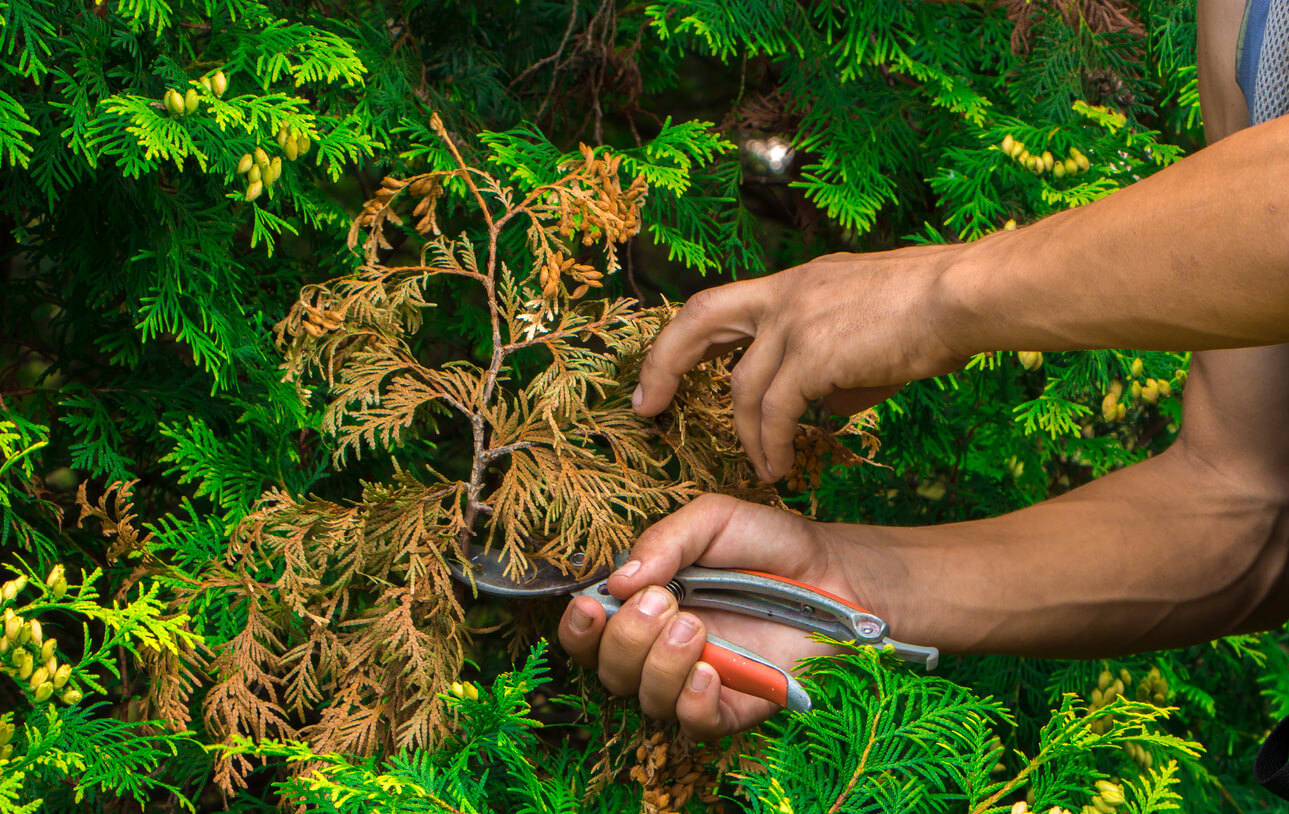
Summer is an excellent time for restorative pruning. Summer pruning tasks may include removing dead, damaged or diseased branches.
Many people think of pruning as a winter task, but there are a number of great reasons to prune your trees and shrubs in summer. Here are six reasons to consider summer pruning.
Help slow growth
Summer is a good time to prune if you would like to slow the growth of a tree or branch. Pruning reduces the the total leaf surface, which reduces the amount of food produced and sent to the roots.
Restore shape and structure
Summer is an excellent time for restorative pruning. You can correct problems that have resulted from over-pruning or poor pruning. You can also clean up damage from winter and spring storms.
Proper pruning will begin to restore most plants’ natural shape. You need to carefully evaluate the tree’s form and likely regrowth patterns. This will help prevent new problems from developing.
You should remove dead, damaged and diseased tree limbs. You should also remove any limb that has the potential to cause damage or stress to your tree. This reduces the chance that a weakened branch will fall on your home during a storm.
Assess health and vigor
In summer, it is easier to evaluate the plant’s canopy for health and vigor. You can see exactly what you are removing, such as defective limbs. You can shorten long lengths of new growth to reduce the risk of storm damage next fall or winter.
Reduce diseases and pests
When performed properly, pruning can reduce diseases in plants. Selectively thinning branches will increase circulation and light penetration throughout the crown. This will help keep the shrub or tree healthy. It is easier to do this when the plants are in leaf, so you can see exactly how much to take out.
Summer pruning can help to control pests. Inspect your trees’ limbs all around to look for pests like aphids and mites. You should pick off and dispose of pest-infested fruit. Removing branches with pest damage helps to ensure the tree’s overall health and long life. It also helps trees to produce delicious fruit that’s free of pests. Do not compost branches that show signs of diseases or pests.
Remove aggressive shoots and redirect branches
Summer is a perfect time to remove aggressive shoots on trees and shrubs with suckering tendencies. You can redirect or reduce the size of branches that are overreaching into neighboring plants or structures. Some plants will need a combination of thinning and heading.
Encourage fruit trees
Many fruit trees produce a crop on short flowering spurs along the bottom half of branches. These don’t need pruning, but cutting back vigorous growth made in spring will encourage more productive growth to develop.
Pruning to improve light penetration can support young fruit tree development. Summer pruning helps trees develop robust and durable branches, which will help to support healthy fruit in the future.
What not to do
You should not do aggressive pruning in summer. Major structural pruning should wait until the plant is dormant in winter.
Improper pruning will stress the plant. You might cut off valuable buds. In most cases, you should avoid topping, shearing or hedging trees and shrubs. This creates rapid regrowth that can destroy the natural form of the plant.
Consider mature size
Knowing how big your trees and shrubs are capable of growing in five to 20 years is the key for a healthy landscape. If you have the right plant in the right place, pruning is mainly focused on removing dead or broken limbs along with crossing or rubbing branches. Minor aesthetic pruning is used to shape the plant.
Contact us for expert help
We are currently scheduling our staff for summer tree and shrub pruning. If you would like a free estimate, contact our office.
Watch In Harmony expert pruning staff
This video explains how to prune a laceleaf Japanese maple in summer. Many of the principles apply to other trees and shrubs as well. This is our most popular video, with over 74,000 views on YouTube.
Learn more
Our YouTube Pruning Tips playlist contains the above video along with videos from Plant Amnesty on basic pruning and from City Fruit on fruit tree pruning. Here are a few more resources.
- Eight reasons to prune plants in summer, BBC Gardeners’ World
- Summer pruning tips, Swansons Nursery
- Is it OK to prune bushes in the summer? SF Gate Home Guides
- Benefits of tree pruning in the summer, Urban Forest Pro
- Top benefits of pruning your trees in the summer, Allan’s Tree Services

Can you come to Freeland WA?
Hi, sorry to say that we do not serve Whidbey Island.
Constant dry heat severely affects my plants. Blossoms are severely lessened and fall much more quickly might it be beneficial to lessen these plants in a cooler time and them attempt to water their roots even more? I live in VA in weather counties to be in the 90s and DRY !
I’m not a “butcher”butI do not want to kill them! RX: my tall Asian lilys have blossomed and now a 4’ stem stands alone?
“Lessen” these plants? I’m not sure what you mean.